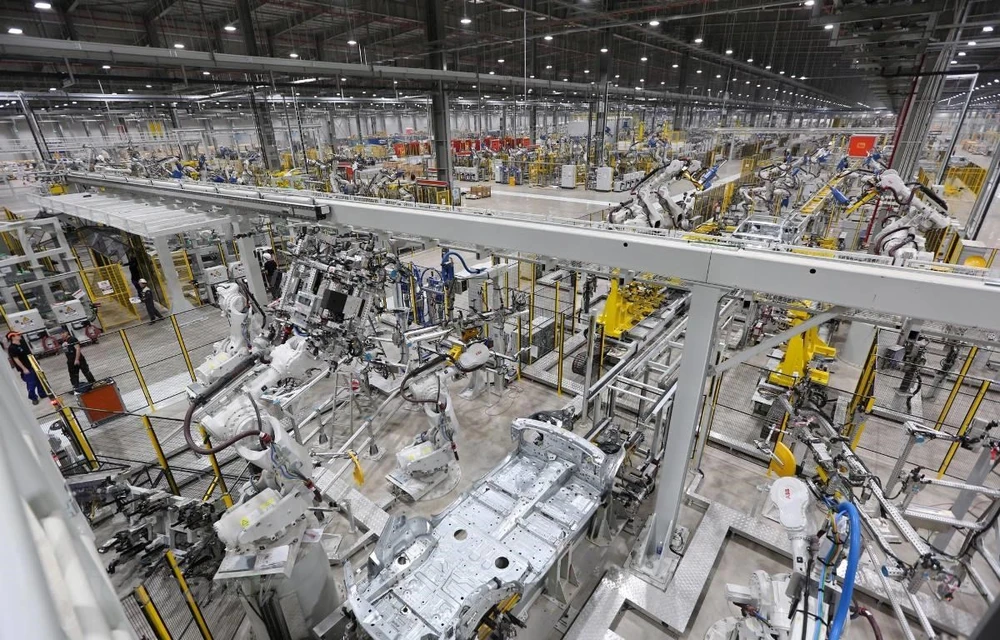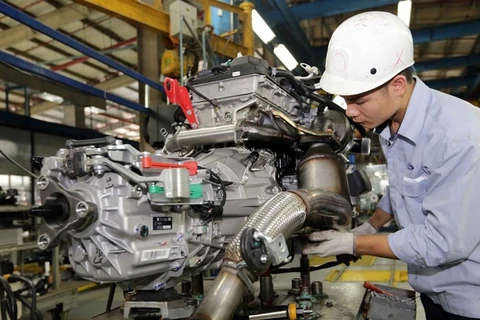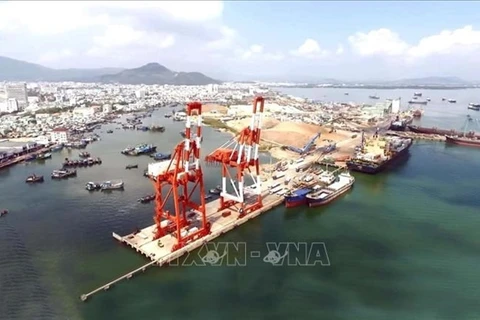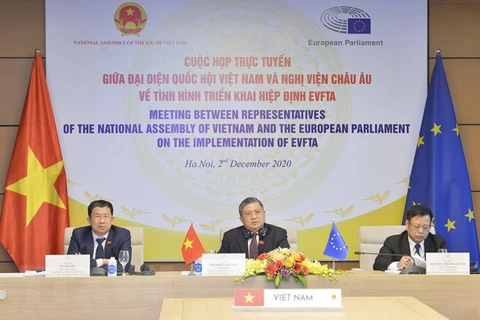
Hanoi (VNA) – Vietnam is jubilantly enjoying “the wheel of globalisation,” said Trinh Minh Anh, Chief of Office at the National Steering Committee on International Integration in Economy, adding that the country’s deep international integration will provide plenty of opportunities to boost exports in large markets, coupled with the robust development of digitalisation and global shift of foreign direct investment (FDI).
Broader access to major markets
Vietnam’s foreign trade posted modest growth in the first 10 months of 2020 with a trade surplus exceeding 20 billion USD, according to the General Statistics Office of Vietnam.
Plenty of opportunities are open up for Vietnamese enterprises as the country holds memberships of a number of new-generation free trade agreements. Most notable among them is the Comprehensive and Progressive Agreement for Trans-Pacific Partnership (CPTPP) which covers a population of 500 million and GDP worth more than 10.5 trillion USD or 13.5 percent of the global GDP, the Regional Comprehensive Economic Partnership (RCEP) which offers them access to the world’s biggest market of 2.2 billion people – about 30 percent of the global population – and GDP reaching 26.2 trillion USD, and the EU-Vietnam Free Trade Agreement (EVFTA) which accounts for 22 percent of the global GDP.
COVID-19 broke out at the time as Vietnam and the world began to shift, with sustainable lifestyles, inclusive development, digital adoption, society and the economy developing, said Dr Vo Tri Thanh, Director of the Institute for Brand and Competitiveness Strategy.
“Amidst the COVID-19 storm, the signs of these trends are still growing,” Thanh said. These bring opportunities to Vietnamese businesses that must create new products to stay relevant to the new market demands, he added.
He further noted that ways of doing business have also changed, with the digital economy and e-commerce booming.
To seize opportunities presented by new-generation free trade agreements, Thanh urged domestic enterprises to improve competitiveness, participate in global value chains and global production networks, and properly select partners to win together.
 Domestic enterprises are urged to improve competitiveness and participate in global value chains and global production networks. (Photo: VNA)
Domestic enterprises are urged to improve competitiveness and participate in global value chains and global production networks. (Photo: VNA)
The rise of the “Internet economy”
Insiders believe that the Internet economy will be one of Vietnam’s competitive edges in the future. The country’s digital economy is estimated to reach 14 billion USD this year, a year-on-year increase of 16 percent, and will likely reach 52 billion USD in 2025, re-accelerating to nearly 29 percent in compound annual growth rate, according to a report from Google, Temasek and Bain & Company.
According to the report, in Vietnam, with its various stages of social distancing, users turned to the internet for solutions to their sudden challenges. A significant number tried new digital services: 41 percent of all digital service consumers were new (higher than the Southeast Asian average), with 94 percent of these new consumers intending to continue their behaviour post-pandemic.
E-commerce has driven significant growth in the country, at 46 percent, alongside strong growth across most sectors, except for travel, it said.
The report also said that Southeast Asia’s digital economy remains resilient at 100 billion USD in gross merchandise value (GMV) despite headwinds and is on track to cross 300 billion USD in GMV by 2025.
According to Vu Tu Thanh, Deputy Regional Managing Director at the US-ASEAN Business Council, the Internet economy is a “bright spot” in the darkness of the pandemic.
With the size of 14 billion USD, Vietnam’s Internet economy is on par with those of Thailand and Indonesia, Thanh said.
The digital economy has seen a sharp increase of 30 – 50 percent in the number of online shoppers, a figure that every sectors is dreaming of, he added.
In May, the government adopted a master plan for national e-commerce development from 2021 – 2025 which highlights e-commerce as one of the pioneering areas of the digital economy, helping businesses enhance their competitiveness.
The government expects that in 2025, B2C e-commerce will expand 25 percent to 35 billion USD, accounting for 10 percent of the country’s total retail of goods and services.
If the pandemic lingers on, transactions are likely to further grow in the areas of ride-hailing services, logistics, transport, banking and finance.
Thanh said Vietnam also reported the biggest growth in fin-tech services, especially Internet and mobile banking. He also forecasts that in the future, FDI flows will shift to the fields of healthcare, infrastructure development services and energy which require large funding.
Nguyen Hoai Bac, Chairman of IQLinks and Director of solar power producer Sunseap Link Vietnam said the country must develop proper policies to attract FDI and make the most of the free trade agreements.
Whether Vietnam can welcome major foreign investors mainly depends on its legal institutions, Bac said. He called for consistency in policy-making as legal institutions and regulations are the most important to mobilising resources, saying policies must remain open to investors from the central to local levels and the government and local administrations should provide enterprises with detail guidelines on how to do business and invest in the country./.
























